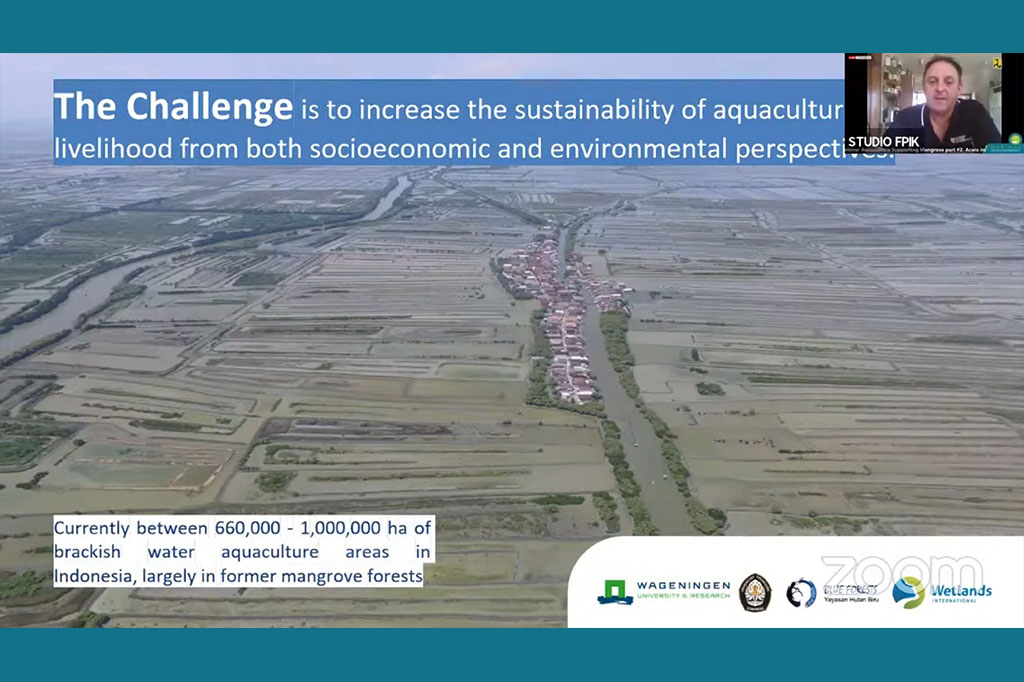AQUACULTURE, SEMARANG – Aquaculture Department, The Faculty of Fisheries and Marine Sciences, Diponegoro University (FPIK UNDIP), last week held a Webinar titled Aquaculture Supporting Mangrove 2nd series with the theme Coastal Field School or Tambak Field School on Wednesday (09/06/2021). This 2nd webinar series presents a number of experts, academics and field practitioners, namely Benjamin Brown, Ph.D (Charles Darwin University), Syafruddin, S. P (Food Crop Protection and Horticulture Center of South Sulawesi Province), Ratnawaty Fadilah, M.Sc. (Department of Agricultural Technology, Makassar State University), Weningtyas Kismorodati, M.Si (community development).
Benjamin Brown, Ph.D. as Chief Technical Advisor of the Blue Forest Foundation explained that related to the 1st webinar series, on June 2, regarding Associated Mangrove Aquaculture (AMA), Ben said that the AMA implemented by the Building with Nature project in Demak Regency offered a solution, namely providing incentives to “sacrifice “A plot of aquaculture ponds with a length of 20 meters for mangrove rehabilitation. The mangroves that are formed are then connected hydrologically with river and coastal ecosystems so as to reduce shocks and disturbances such as floods. The Low External Input Sustainable Agriculture (LEISA) approach together with the implementation of farmer field schools (SL) will result in better management practices.
Syafruddin, facilitator of SL from the Center for Food Crops and Horticulture Protection, South Sulawesi, explained that SL has advantages, including increasing observation and knowledge of farmers or farmers through discovery-based learning, building self-confidence and increasing decision-making and problem solving capacity, changing beliefs and behaviors has taken root, encouraging environmentally friendly cultivation. Meanwhile, the disadvantages are that the implementation time is sufficient, requires experienced facilitators, and costs are quite expensive. In order for SL to run effectively and comprehensively (from an ecological, economic and social perspective), it is necessary to design an attractive activity so that the enthusiasm of the participants is always maintained as well as an effective monitoring and evaluation design.
Ratna Fadilah from the Blue Forest Foundation Makassar, South Sulawesi explained that SL was developed as a response to a training and empowerment approach that is generally used but not effective. SL Tambak takes an innovative, participatory, and interactive approach that emphasizes learning based on discovery and problem solving so that coastal communities are able to build their sense of self-confidence and expand local knowledge in a sustainable manner.
The success of SL Tambak is also highly dependent on the success of organizing the farmer groups. Weningtyas emphasized that organizing a group of farmers would facilitate the achievement of SL’s goals. The duration of the Farmer Field School is at least 1 cycle of pond cultivation (± 3 – 4 months) or based on the cultivation topic studied. At the end of the webinar session, participants are invited to compare the learning demonstration plot and habits/comparisons. The final result of SL is a process of holistic understanding of the members of the study group towards problems and finding solutions (the emergence of critical thinking), not just the quantity or nominal of the harvest.
In particular, Prof. Sri Rejeki, Restiana W. Ariyati and Lestari L. Widowati from the Department of Aquaculture FPIK UNDIP explained the implementation of the Field School in Demak Regency. Field Schools play an effective role in increasing pond production through the application of Sustainable Cultivation Technology with Low External Input (LEISA), so as to increase the income of farmers.
Prof. Sri Rejeki and his team provided counseling and assistance to more than 270 farmers in 10 villages in Demak Regency from 2016 – 2019. The materials provided included: Good Fish Cultivation Methods; proper pond processing; pond water quality monitoring (pH, salinity, temperature, dissolved oxygen); observing the color of pond water using a color card to determine the growth of plankton after administration of MOL (liquid fertilizer) and the application of LEISA for sustainable aquaculture. For 3 years, the implementation of LEISA in 10 had a positive impact, namely farmers who had followed SL experienced a 2-fold increase in milkfish production (200%), increased shrimp production by 25-50% and reduced the risk of crop failure.
The 2nd series of a series of 3 Associated Mangrove Aquaculture Webinars held through the Zoom application and YouTube live streaming was initiated by Wetland International and the Ecoshape Foundation, with the contribution of partners from the Department of Aquaculture, FPIK UNDIP, NGO Blue Forest and Wetland International Indonesia. The enthusiasm of the participants was seen in the QnA session led by the moderator, Mrs. Woro Yuniati. The discussion was interesting with the speakers and Dr. Roel H. Bosma who participated from Wageningen, The Netherlands via the Zoom platform. This 2nd series of webinar can be viewed online via the Official FPIK UNDIP YouTube link. (Source: undip.ac.id | Tim Humas UNDIP)


Recent Comments